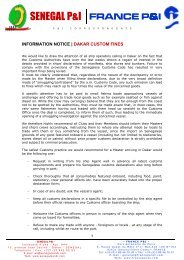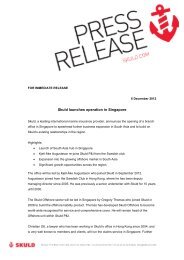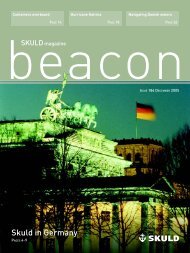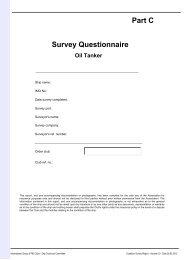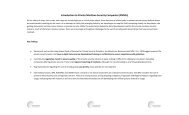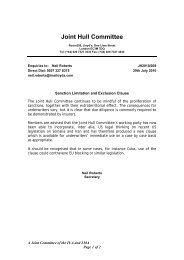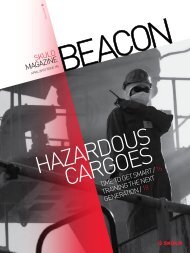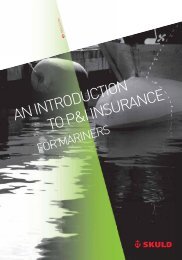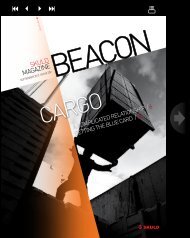You also want an ePaper? Increase the reach of your titles
YUMPU automatically turns print PDFs into web optimized ePapers that Google loves.
Around 60% of Smit Salvage’s<br />
work has environmental<br />
protection as its goal<br />
Smit and the world of salvage<br />
By Tony Redding, Director, Smit Salvage/TRS reprise<br />
SMIT Salvage B.V. traces its origins back to 1842. Today, it is a member of a group providing<br />
global services in the areas of salvage, harbour towage, terminals and heavy transport/heavy lift.<br />
Salvage includes emergency response, wreck removal and environmental protection tasks, such<br />
as the removal of pollutants from wrecks.<br />
The contractual basis of salvage<br />
Many salvage and towage operations are<br />
performed under lump sum or daily hire<br />
arrangements. Standard agreements are<br />
widely used as they are ‘neutral’ and do not<br />
favour any party. SMIT Salvage Commercial<br />
Director Geert Koffeman told seminar<br />
delegates that these contracts are<br />
appropriate when there is no acute<br />
emergency. However, if there is an active<br />
threat of vessel loss and/or pollution,<br />
salvage contracts such as Lloyd’s Form<br />
(LOF) are important. He said: "LOF 2000,<br />
the latest edition, is a Lloyd’s document<br />
and is designed for instant response. When<br />
LOF is agreed, financial issues are set<br />
aside for resolution at a later date. Instead,<br />
the focus is on solving the immediate<br />
problem. The responsibility passes to the<br />
salvor, who must use his ‘best endeavours’<br />
to salve ship and cargo and prevent<br />
environmental damage."<br />
Responsibilities are set out in The Salvage<br />
Convention 1989. A new system of salvage<br />
remuneration was introduced in 1999.<br />
It is known as SCOPIC – the Special<br />
Compensation P&I Club clause. This<br />
largely supersedes the 1989 Convention’s<br />
Article 14 Special Compensation<br />
arrangements. SCOPIC is a ‘safety net’,<br />
designed to prevent the salvor suffering<br />
heavy financial loss in high risk/low value<br />
situations. This safety net is required in<br />
around 20% of cases.<br />
Aspects of operational response<br />
Cape Town-based Dave Main is General<br />
Manager of SMIT Salvage, South Africa. He<br />
told the seminar that modern communications<br />
transformed the business of salvage.<br />
"Today, salvage is usually agreed in<br />
discussions between the salvor’s office and<br />
the offices of the owners and insurers. The<br />
objectives have also changed. Around 60% of<br />
our tasks now have environmental protection<br />
as the main aim." He then gave a vivid account<br />
of a practical example, the grounding of a<br />
ro-ro vessel on the South African coast.<br />
Major salvage and wreck removal cases<br />
During the seminars, SMIT Senior Salvage<br />
Consultant Bert Kleijwegt presented an<br />
overview of several challenging salvage<br />
operations, i.e. the chemical tanker Levoli<br />
Sun, the submarine Kursk, the vehicle<br />
carrier Tricolor and the tanker Prestige.<br />
Media and communication management<br />
The Oslo and Bergen seminars concluded<br />
with an interactive session led by casualty<br />
response and media specialist Tony Redding.<br />
His message to the delegates was the<br />
following: "It is important to be<br />
straightforward and avoid appearing<br />
evasive. It is best to concentrate on the<br />
measures being taken to deal with the<br />
emergency. It is dangerous to speculate<br />
and appear over-confident in a situation<br />
that is still developing."<br />
It is possible for an owner to be at the<br />
centre of a major marine accident and spill<br />
and receive relatively little media attention.<br />
The news focus may be on other parties.<br />
However, a high-profile case can impose<br />
extreme communications workloads. There<br />
may be a need to provide 24-hour service<br />
to the international media, for a significant<br />
period."<br />
(Please note that this is an abridged version<br />
of the original article.)<br />
BEACON 21


